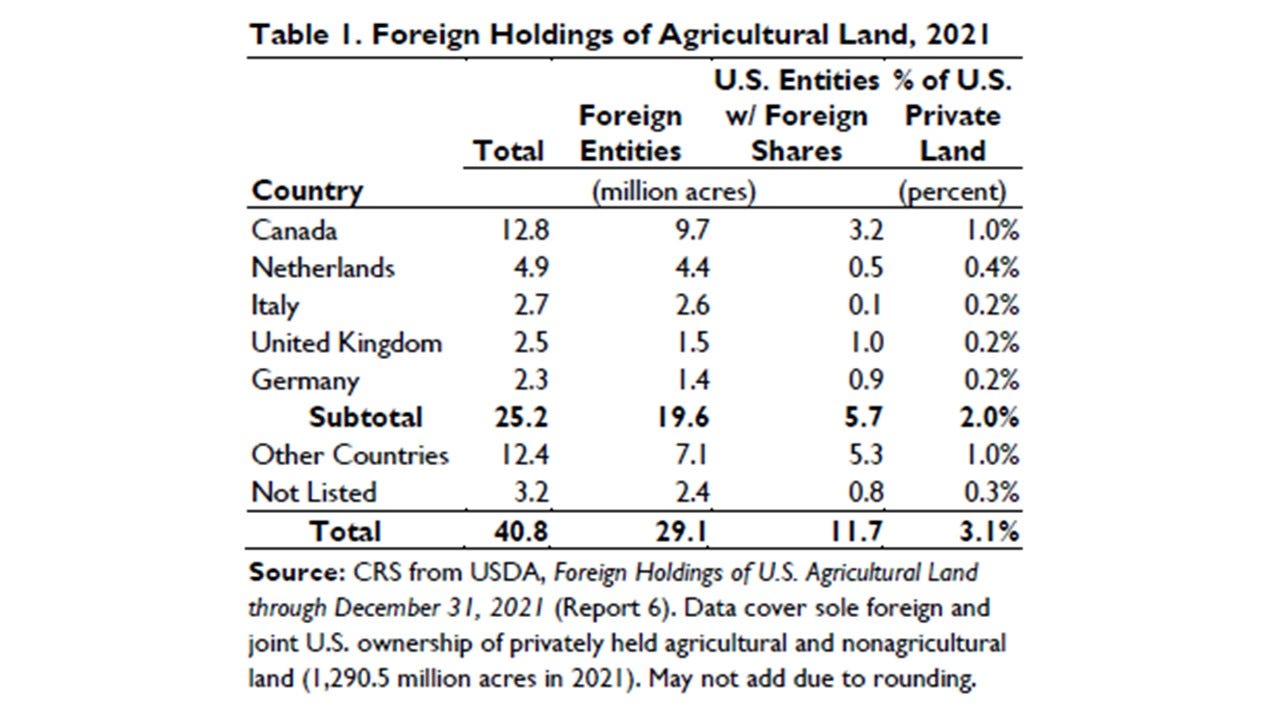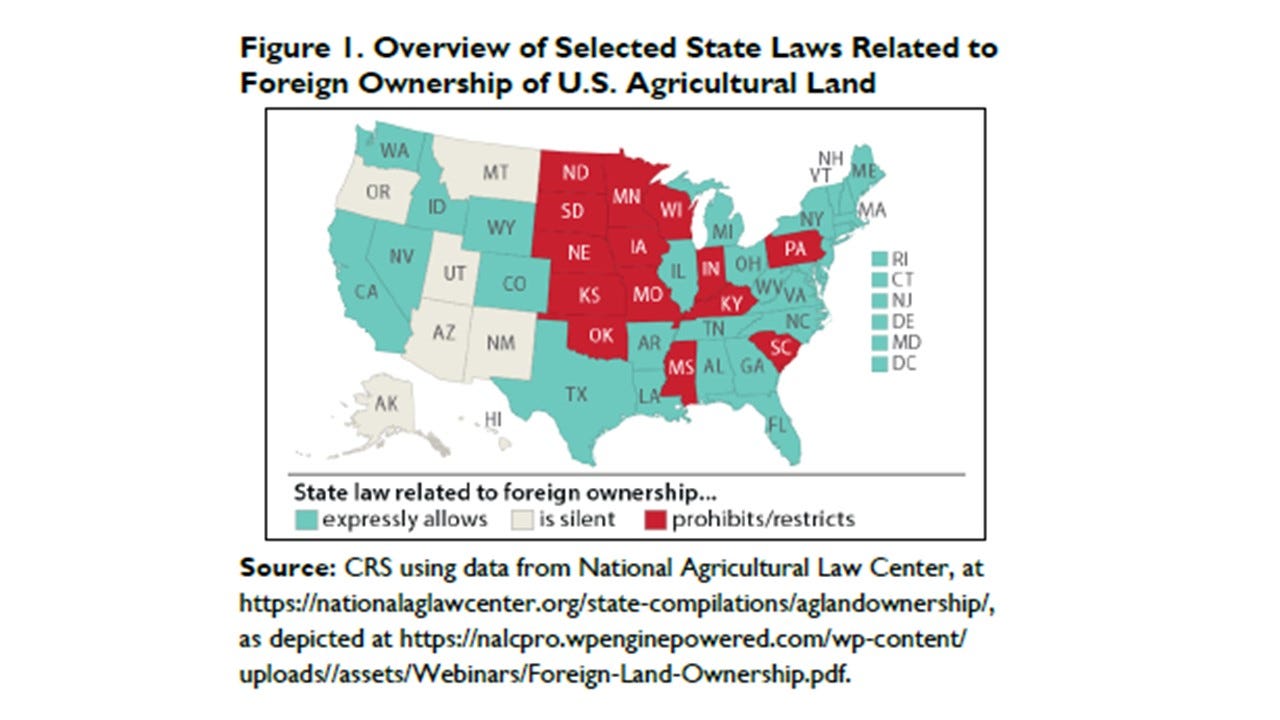China's Land Grab?
Can Foreign Acquisitions be stopped in the US where our rights make us vulnerable?
Photo credit: https://www.nj.com/opinion/2023/01/we-cant-let-china-buy-up-new-jersey-farmland-opinion.html
Is China really buying up agricultural land at an alarming rate that is a threat to national security?
U.S. Department ofAgriculture data show that Chinese ownership of U.S. farmland leapt more than 20-fold in adecade, from $81 million in 2010 to $1.8 billion in 2020.1
But is China really the top foreign government to purchase land in the U.S.? Not by a long shot. Here are the USDA data on foreign ownership:
Canada, Netherlands, Italy, United Kingdom and Germany are all considered allies and certainly diplomatic friends. But even the smallest purchase of 300 acres of agricultural land by Chinese entity FuFeng should be considered a threat to national security, and especially if it is within a stone’s throw of a national defense military base.2 Maj. Jeremy Fox, an officer at the Air Force base wrote,
“Some of the most sensitive elements of Grand Forks exist with the digital uplinks and downlinks inherent with unmanned air systems and their interaction with space-based assets, and any such data collection would present a costly national security risk causing grave damage to United States’ strategic advantages.”3
Strategically purchasing land, not just the volume of land makes any land purchase by China to be a potential risk to the U.S., worthy of screening.
Can the US stop China from buying up farmland in the US?
The U.S. government has the power to regulate foreign investment, but it may not necessarily have the ability to completely stop China from buying farmland in the U.S.. The U.S. government may be able to restrict or impose conditions on such investments through the Committee on Foreign Investment in the United States (CFIUS) review process, but this is ultimately a decision made on a case-by-case basis.
If Food Security is important, then where is CFIUS?
Our national security depends on food, energy and water. Overlooking food security would be a strategic mistake.
In 2013, the China entity, Shuanghui International Holdings, Ltd., bought Virginia Smithfield Ham company, an old traditional agricultural company in Virginia doing business as long as I can remember. It is still in the same small town where it was founded and gets its name. It was the largest acquisition ever of a U.S. company by a Chinese firm at $4.7 billion (apparently a unanimous decision by the stockholders). Smithfield Foods happily agreed to be purchased by China's largest meat producer.4 Now China dominates the world market on pork production and controls most of the U.S. pork supply.
China is not just focusing on land acquisition in the U.S., but on Africa. Over the past decade they have made unprecedented investments in African land,5 educational institutions and healthcare. Some have called it the second colonization of Africa. So China doesn’t really need more land for agriculture or food production in the U.S.. Nor do we need a second colonization.
Property law is local not Federal
Our propensity for freedom is one of our great vulnerabilities and foreign entities have been known to exploit it. The freedom to board a flight without personal inspections and invasive body scanners in 2001 was exploited by the attackers on 9/11 who boarded a flight with simple weapons that enabled them to carry out the largest terrorist attack on American soil in our history. So, too, China is looking at our cherished freedom to freely buy and sell land in the U.S. as a vulnerability to exploit.
Controlling the foreign purchase of land would have to happen at the local level in the property recording office of each county. Constitutional federalism will make it a high bar to impose federal rules to require land purchase restrictions at the local level.
It is within the constitutional Art. II power of the President to act on behalf of the nation in national security matters, short of declaring War, which is the role of Congress. So Congress could pass legislation to give the President the power to block the sale of U.S. businesses that would constitute a threat to national security.
States and counties could legislate control of the sale of land to foreign entities. Some have done so.
States with restrictions on foreign sale of agricultural land
There are fourteen states that prohibit or restrict the sale of agricultural land to foreign governments or persons, according to the University of Arkansas National Agricultural Law Center that did a study of state and local laws. However, more than half of the states in the U.S. expressly allow the purchase of agricultural land by foreign governments or persons. Any federal legislation would require at least partial if not complete preemption of these state laws in order to prevent the sale of agricultural land to foreign entities. This would be met undoubtedly with a judicial challenge based on a violation of constitutional federalism with the federal government overstepping its authority into state and local sovereign power.
But states and counties could legislate control of the sale of land to foreign entities. And some have done so. But why would these states be so supportive of allowing foreign investment? The following data which shows a significant amount of land in which states are already held by foreign governments may explain it. My own state, Texas, has the highest number of acres of agricultural land held by foreign entities of any other state. This may explain why there are only two Texas members of Congress who have signed a bill prohibiting China investment in agricultural land. But Texas is not alone. The following states also have significant foreign investment.
Some states are not likely to support prohibiting foreign investment
States are required to report data of foreign investment in agricultural land under the Agricultural Foreign Investment Disclosure Act of 1978 (AFIDA)6 . The U.S. Department of Agriculture administers this statute and oversees the collection of data from states about foreign ownership of agricultural lands. Foreign ownership is defined by “foreign government” and “foreign person” which is fairly broad.7 Agricultural land is defined to include land “used for agricultural, forestry, or timber production purposes as determined by the Secretary . . . .” 8
As of year-end 2021, according to USDA, the states with the most foreign-owned agricultural acreage were Texas (5.3 million acres), Maine (3.6 million acres), Colorado (1.9 million acres), Alabama (1.8 million acres), and Oklahoma (1.7 million acres). Other states with more than 1 million foreign-owned acres were Arkansas, California, Florida, Georgia, Kansas, Louisiana, Michigan, New Mexico, Oregon, and Washington.9
Legislative solutions?
Proposals in the last two Congressional sessions have not passed. They were designed to strengthen the reporting mechanism, AFIDA; or to limit the ability to seek agricultural subsidies as a foreign entity. No bill has been able to limit the amount of land owned by a foreign entity.10
We already have a reporting statute which could be strengthened within the scope of the authority by the Department of Agriculture. We already have a statutory process in place that has charged the Executive Branch with reviewing foreign purchases of American businesses for Congressional certification that could be a threat to national security.
CFIUS was amended in 2018 by the Foreign Investment Risk Review Modernization Act of 2018 (FIRMMA) and new regulations promulgated and effective Feb. 13, 2020 require more covered transactions. CFIUS’s expanded authority includes critical technologies and infrastructure, sensitive personal data, and real estate transactions and those near sensitive U.S. sites.11
CFIUS conducts risk assessments when considering transactions which considers the intent and capabilities of the buyer, the vulnerability of the U.S. business and the consequences to national security if those vulnerabilities were exploited.
The new regulations expand CFIUS’s jurisdiction over noncontrolling investments made by foreign persons in U.S. businesses involved in: (1) critical technologies, (2) critical infrastructure, and (3) sensitive personal data on U.S. citizens. These fall into these categories of businesses: (1) telecommunications; (2) energy; and, (3) products, weapons, and materials designated by the U.S. Department of Defense. There are 18 factors for considering whether a transaction is a threat to national security.
What we need is the political will to preserve food and water security by screening potential purchases of agricultural land or businesses by any foreign entity with a higher level of scrutiny using the regulatory criteria.
Where was CFIUS when a China company, WuXi, in 2015 bought/invested a majority share in the company, 23&Me, which has the largest collection of American individuals’ personal DNA information of any company in the world? WuXi also bought a Pfizer manufacturing plant in China, adding a production facility in Massachusetts.12 They were silent. The statute did not extend the business categories to genetic consumer companies. But the new regulations have added one factor:
the extent to which a covered transaction is likely to expose, either directly or indirectly, personally identifiable information, genetic information, or other sensitive data of United States citizens to access by a foreign government or foreign person that may exploit that information in a manner that threatens national security;
A true case of closing the barn door after the horse has left.
Where was CFIUS when the Virginia Smithfield Ham company was purchased in 2013 by the China? Silent. Except there was no amendment for food processing companies. Stunning lack of foresight for food security. I would like to have seen that barn door closed to prevent future escaping horses.
CFIUS could be the gatekeeper for national security but it has utterly failed us repeatedly. The entire statute should be amended to take in all industry categories for review and implement the kind of review that has been expected of CFIUS but that has underdelivered, underperformed and as a result, undercut U.S. national security.
Maybe the China surveillance balloon spotted this week was just a mission to check on the U.S. farms and strategic military monitoring outposts? Upload some data?
_____________________________
(I wrote about 23&Me and their effort to get a designer baby patent in the U.S. here, and now you know further troubling is that they are largely owned by China. )
https://www.wsj.com/articles/the-chinese-are-buying-the-farm-north-dakota-hong-kong-land-food-shortage-supply-chain-usda-11662666515
https://www.cnbc.com/2022/07/01/chinese-purchase-of-north-dakota-farmland-raises-national-security-concerns-in-washington.html
https://www.cnbc.com/2022/07/01/chinese-purchase-of-north-dakota-farmland-raises-national-security-concerns-in-washington.html
https://www.dailymail.co.uk/news/article-2334460/Virginia-hocks-Ham-Capital-World-China-snaps-leading-pork-producer-record-4-72-billion.html
https://www.brookings.edu/blog/africa-in-focus/2015/11/05/what-do-we-know-about-the-chinese-land-grab-in-africa/
7 U.S.C. §§3501-3508 .
https://www.law.cornell.edu/uscode/text/7/3508 .
7 U.S.C. 3508; 7 C.F.R. §781.2.
https://crsreports.congress.gov/product/pdf/IF/IF11977
https://crsreports.congress.gov/product/pdf/IF/IF12312
https://www.willkie.com/-/media/files/publications/2020/05/expandedcfiusjurisdictionunderfirrmaregulations.pdf
https://www.nytimes.com/2021/10/22/us/politics/china-genetic-data-collection.html







